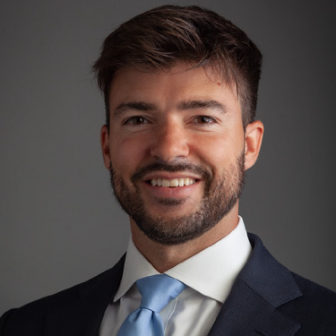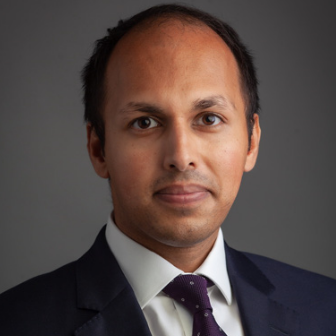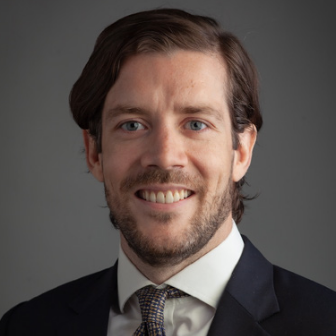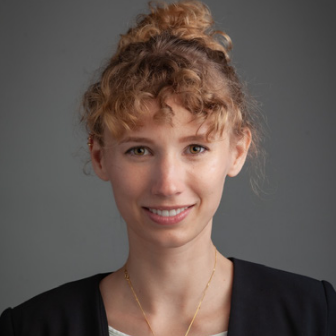Christopher Lees
Senior Fund Manager
Host:
There's so much noise in financial markets right now around inflation and interest rates, geopolitical tensions, energy prices, evaluations, ESG, the list goes on. It's hard to know what to listen to and what to take most notice of. To help us make sense of it all, I welcome, Chris Lees, senior fund manager of the JOHCM Global Select Fund who's been watching markets for a few decades now, is that fair to say?
Chris Lees:
Yeah, just over 30 years.
Host:
You've seen plenty of cycles and plenty of noise in markets over the years. Just upfront before we get to these sorts of implications that what's going on now has, how should an investor approach a period like this when there's so much information coming at them?
Chris Lees:
I think they should always try and separate noise from signal and it's actually getting harder as we go into the information age, because there's so much noise and misinformation. The ability to separate the noise from the signal was always important 20, 30 years ago, but it's even more important today.
Host:
With that in mind, what are the big themes that investors should be thinking about? Then following from that, the long-term implications from those things.
Chris Lees:
Well, if you look at it from an evidence-based perspective, the first invasion of a European democratic country since the 1940s probably isn't noise. It's probably a very, very, very profound signal. We actually think three things very important from the Ukrainian invasion.
Chris Lees:
Number one, obviously it's a tragic humanitarian disaster, but it's really interesting watching how the west is rallying around to help where it can. That's number one.
Chris Lees:
Number two, it is a genuine geopolitical inflection point. Really, we must understand that and recognize that it will affect our children and our grandchildren. Some evidence for you of what a geopolitical inflection point this is, Germany has basically ripped up its pacifist constitution. Germany is re-arming itself. Germany is committed to spending more on defense spending than Russia as a percentage of GDP. That's not noise, that signal.
Chris Lees:
Other amazing geopolitical inflection point, just evidence to share with the audience, Swiss banks have been neutral for 500 years. This is the first time Swiss banks have ever agreed to enforce American sanctions. That's not noise, folks. That's an incredibly profound geopolitical inflection point. Think about realizing that the world as we knew it, it's changing. It always is changing obviously, but this is significant.
Chris Lees:
The third one relevant to investors is because it's such a geopolitical inflection point, this is a genuine financial market regime shift. Like when water turns to ice, you got to stop swimming. Then when ice turns back to water, you got to stop ice skating. Very similar here with such a great big genuine financial inflection point, we're seeing things like the rotation from growth to value as a factor seems to have stopped since the Ukraine invasion. Now there's a rotation from value to defensive, low beta, quality growth stocks for example. Those are the type of medium to long term things that we think people should be looking for.
Host:
So bringing that back to an investor, you just gave a great example then of going to defensive stocks. What you've said Chris is a very, very big picture. What are the things that will fall out of this? The fact that Swiss banks aren't neutral. That Germany is not a pacifist nation anymore. How do investors think about that in terms of long-term thematics and how to invest?
Chris Lees:
Well, some of them are very, very good for Australia. That's the first conclusion for your audience. Clearly commodities are now a geopolitical strategic weapon and the companies are scrambling to secure commodities that they need from safe jurisdictions. That's the key, safe jurisdictions. Anglo-Saxon protected legal rights, for example, that's Canada, that's Australia. All of a sudden, those are two great commodity exporting nations. The outlooks got even better because those are safe places to buy your commodities from. Commodity buyers are questioning the less safe places to buy their commodities from because you can't buy them from Russia and you can't get them from Ukraine at the moment.
Chris Lees:
Latin America is another big winner, but of course you take a little bit more geopolitical risk if you buy a copper stock in Latin America than if you buy a copper stock in Australia. Indonesia, big winner from all of this. Indonesia's an exporting powerhouse of commodities. Again, obviously you take a little bit more risk if you buy your commodities from Indonesia than you do if you're buying them from Canada or from Australia.
Chris Lees:
We've seen a clear shift in our top down monthly scorecard. A clear improvement in Australia, clear improvement in Canadian and Latin American equities. It wouldn't then just be the commodity related equities in those markets. Many other equities, whether it's financials or CapEx spending or industrials or technology, they will all benefit at the margin from this regime shift.
Chris Lees:
Which begs the question, who are the big losers? Their commodity importers are the big losers. We're going to have higher for longer commodity prices. The big commodity importers are Japan, so their terms of trade get worse. Europe obviously, their terms of trade get worse because that's a big importer of commodities. North Asia, Asia's a massive importer of commodities. They're the three areas that get slightly worse at the margin.
Host:
Where does the US fit into all this?
Chris Lees:
Well, nicely somewhere in the middle. The US is home to some of the most entrepreneurial, forward thinking capitalistic companies. You should never write them off. In fact, when I first started in business 30 years ago, my mentor said, Chris, America's the greatest emerging market on the planet. If you want emerging markets, go to America first. The ability for American companies to pivot, they're far quicker than European or Asian companies to pivot.
Chris Lees:
Don't dismiss America just because it looks slightly expensive on valuation grounds. Remember you tend to get what you pay for. A Ferrari costs more than a Fiat for a reason. Some of the best opportunities are still in America. Most of our portfolio is still in America. At the margin, America wins because of fracking and natural gas so Europe won't be buying much Russian gas for the next 10 years. Europe will be buying a lot of American gas so that means you need to think about looking for the investments for who's going to ship LNG from America to Europe. Who's going to ship LNG from Australia to China and to Europe. You need new pipes, new ships, so there's a CapEx boom going on and a lot of American companies are at the center of that. We own a few of them in portfolio.
Host:
Chris, thank you for joining us today.
Chris Lees:
Thank you.
Host:
If you want to know more about Chris, J O Hambro or the JOHCM Global Select Fund then please visit JOHCM.com
This podcast is for professional investors only. The information contained within this podcast including any expression of opinion is for information purposes only and is given on the understanding that it is not a recommendation. Views as of date of recording, 19 April 2022, and are subject to change. Past performance is no guarantee of future performance. The value of investments and the income from them may go down as well as up and you may not get back your original investment.
An investor should consider the Fund’s investment objectives, risks, and charges and expenses carefully before investing or sending any money. This and other important information about the Funds can be found in the Fund’s(s) prospectus or summary prospectus which can be obtained at www.johcm.com or by calling 866-260-9549 or 312-557-5913. Please read the prospectus or summary prospectus carefully before investing. The JOHCM Funds are advised by J O Hambro Capital Management Limited and distributed through Foreside Financial Services, LLC, member FINRA. The JOHCM Funds are not FDIC-insured, may lose value, and have no bank guarantee.
Investors should note that investments in foreign securities involve additional risks due to currency fluctuations, economic and political conditions, and differences in financial reporting standards. Smaller company stocks are more volatile and less liquid than larger, more established company securities. The small and mid-cap companies the Fund may invest in may be more vulnerable to adverse business or economic events than larger companies and may be more volatile; the price movements of the Fund's shares may reflect that volatility. Fixed income securities will increase or decrease in value based on changes in interest rates. If rates increase, the value of the Fund’s fixed income securities generally declines. Other risks may include and not limited to hedging strategies, derivatives and commodities.
By clicking Proceed I confirm I have read the important information and agree to the terms of use.
This website uses cookies to remember your preferences and help us improve the site. By proceeding, you agree to cookies being placed on your computer. Read our privacy and cookie notices.
For a better experience, we recommend viewing this website in landscape orientation.

Head of Equity Impact Solutions
14 years' industry experience, joined Regnan in June 2020.
Tim Crockford leads the Regnan Equity Impact Solutions team. He previously managed the Hermes Impact Opportunities Equity Fund from its launch in December 2017, having co-founded the Hermes Impact team in 2016. Tim joined Hermes Investment Management in 2009 as a research analyst for the European Equities team and became lead portfolio manager of the ESG-integrated Hermes Europe ex-UK Equity Fund in 2015, which he also managed until he left Hermes.

CFA, Fund Manager
13 years’ industry experience, joined Regnan in May 2020.
Mohsin is a fund manager dedicated to the strategy. He was previously a senior analyst on the Hermes Impact Opportunities Equity Fund, having joined Hermes in 2017. Prior to Hermes, Mohsin was an investment manager in Global Equities at Pictet Asset Management. At Pictet his experience included working on thematic equity funds including Water, Clean Energy and Agriculture.

CFA, Analyst
10 years’ industry experience, joined Regnan in May 2020.
Maxime is an investment analyst dedicated to the strategy. He has a decade of experience in sustainable investment. Previously, as an investment analyst at Hermes from 2016, he participated in the design, launch and management of the Hermes Impact Opportunities Equity Fund. Prior to this he led the integration of ESG and stewardship across investment strategies.

CFA, Analyst
6 years’ industry experience, joined Regnan in April 2020.
Maxine is an investment analyst dedicated to the strategy. She was previously an analyst on the Hermes Impact Opportunities Equity Fund. Maxime transferred to the Hermes Impact team in 2016, having initially joined the Hermes EOS team in 2014. She headed up the chemicals sector team, while also focusing on the financial services, industrials and technology sectors.
